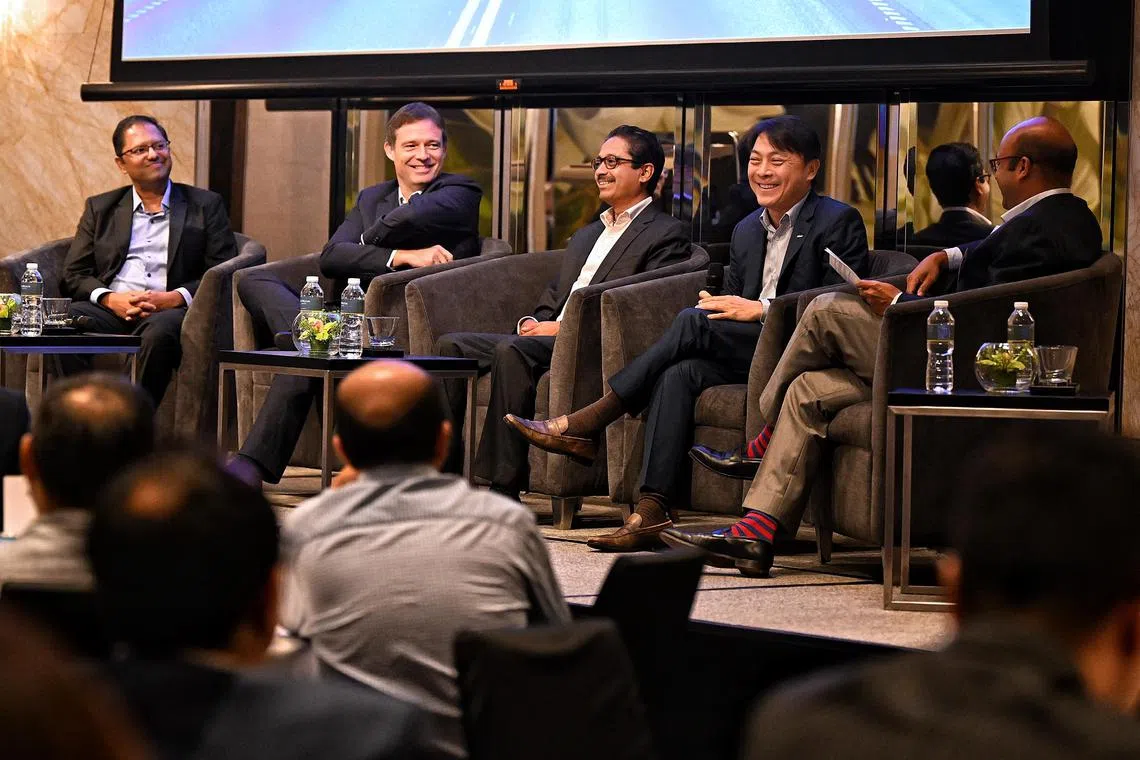CEOs delay and halt investments, expect upcoming recession: Survey
Sign up now: Get ST's newsletters delivered to your inbox

(From left) EY Asia-Pacific Private Equity leader Luke Pais, Asia-Pacific EY-Parthenon Consumer leader Olivier Gergele, Olam Agri CEO of operation and group CFO N. Muthukumar, Keppel Land CEO Louis Lim and EY Asean Strategy and Transactions leader Vikram Chakravarthy.
ST PHOTO: CHONG JUN LIANG
SINGAPORE – Local bosses are in full agreement that a recession is in store this year with many planning to delay or halt planned investments, a new survey noted.
It also found that 50 per cent of the 1,200 chief executives polled globally last November, including 40 here, expect a severe or persistent downturn, with about half of them fearing a worse recession than the one stemming from the global financial crisis of 2007 to 2008.
Regionalisation, scarcity and cost of talent, and inflation were listed as the top three risks threatening business growth.
Other challenges cited included monetary policy uncertainty, restrictive regulatory environments caused by increasing fragmentation of the global economy, cyber-security risks and heightened geopolitical tensions.
CEOs are now adopting a cautious approach, with 75 per cent of those polled here delaying or stopping planned investments until the geopolitical situation improves, noted the survey by professional services firm EY.
Despite expecting a recession, all of the Singapore bosses, a striking 100 per cent, are still looking to pursue deals, including mergers and acquisitions, divestments, joint ventures or strategic alliances with third parties.
And 25 per cent of Singapore respondents plan to increase investments in sustainability, while 33 per cent aim to invest more in talent, including workforce well-being and skills development.
The need to be sustainable is more urgent than ever with more meat consumption and increasing supply constraints, noted Mr N. Muthukumar, CEO of operation and group chief financial officer of agribusiness Olam Agri, who was speaking at a panel discussion at The Westin Singapore following the survey launch on Friday.
“A lot of people talk about climate change, but I think the more important emergency is the danger of biodiversity collapse and growing geopolitical fragmentation, almost 70 countries introduced a protection or trade barrier in 2022 while bracing themselves for price inflation,” he added.
Keppel Land CEO and executive director Louis Lim noted that it is difficult to convince small and medium-sized enterprises (SMEs) to pay money for sustainability.
“A number of our local banks have already articulated net zero commitments by 2050. This means that they’re committing it for their client base as well, which means they have an impetus to get their clients to net zero,” he said.
If SMEs can invest in going green, banks should help to enable that by giving green loans, Mr Lim added.
“Not everybody will see sustainability as worth investing in, but with the way the world is heading and the urgency of getting to net zero for many companies, that is an issue.”


